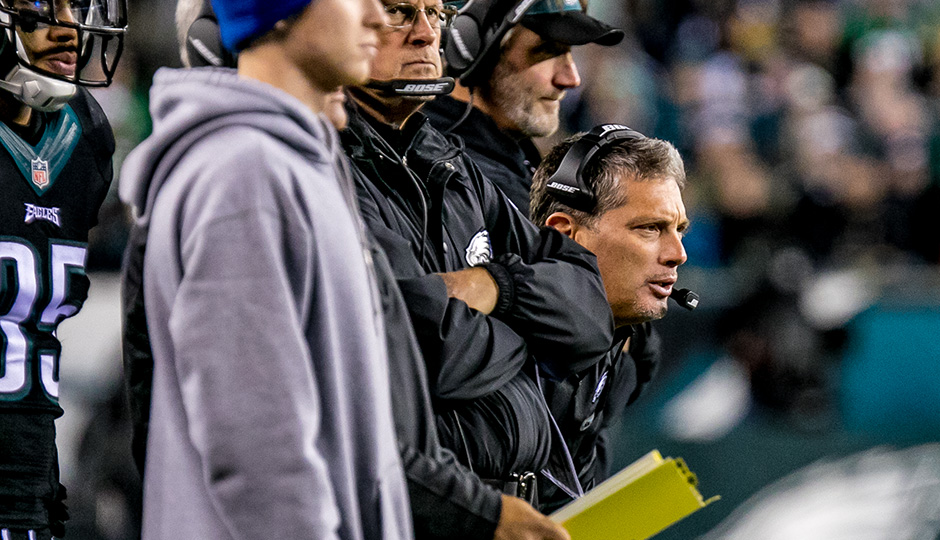Jim Schwartz Breaks Down Key Plays vs. Washington

Jim Schwartz. (Jeff Fusco)
On a play-to-play basis, the Eagles’ defense was much improved against Washington the second time around compared to the first. They gave up 334 total yards as opposed to 493, and only 16 first downs after initially allowing 26. But because of the big plays they conceded on Sunday, they surrendered the same amount of points (27) and a similar yards per play average (7.3 vs. 7.4) compare to the first matchup.
“It was good to see us getting back to doing some of the things that help us be successful. I think the only third-down conversions we gave up were third-and-1 and third-and-2, which are tough; getting a turnover and getting on the scoreboard there and getting some pressure on the passer,” Jim Schwartz said.
“(But) we can’t judge ourselves on anything other than winning or losing the game, and we got to make sure that that doesn’t happen. Stats don’t mean anything. Wins or losses mean something. We didn’t do enough to win the game.”
The biggest play Schwartz’s unit allowed was DeSean Jackson’s 80-yard touchdown catch in the third quarter, which gave Washington the lead. In giving his team the 14-13 edge, Jackson became the first player to ever record two career touchdown catches of 80 or more yards against the Eagles (h/t Reuben Frank).
After the Eagles used a lot of cover-4 zone schemes in the first half with two high safeties and both outside cornerbacks typically giving some type of cushion, Washington decided at halftime to call a play early in the third quarter specifically to beat that coverage. They had Jamison Crowder, who was in the slot, run to the flat to pull down Malcolm Jenkins, giving Jackson a one-on-one opportunity against Leodis McKelvin deep down the field.
“Leo was in good shape early in that route and he was just in bad shape late,” Schwartz said. “ That’s a play that we talk all the time about times you can be aggressive and times you can’t. That’s one of those ones — just get over the top. Again, he was in good position early. DeSean is fast, and took over.
“That’s sort of life as an NFL corner: you’re going to give up some plays. We just can’t make them an 80-yard play. Like I said, if that’s a 60-yard play and we get them on the ground, we get a chance to make another play.”
Kirk Cousins, who only completed 14 passes but finished with 11.1 yards per attempt and a 116 passer rating, also threw a third-quarter touchdown pass to Pierre Garçon. Nolan Carroll was covering Garçon, but Schwartz took some of the blame for giving up the 15-yard score.
“I look at myself first as the play caller. Sure Nolan’s technique can be a little bit better and things like that, but I can help him with the play call,” Schwartz said. “Second-and-goal from the 15, we feel like, okay, now you got a good chance to hold them to a field goal there, and I played an aggressive defense there. Sometimes when you try to stop everything, you set those guys up.
“And I can help him either play a little softer coverage there, give up five or 10 yards, get him the third down, or maybe even go more aggressive and all-out blitz, if they throw quick on an all-out blitz. But I can help him out there.”
The Eagles also allowed a pair of touchdowns on the ground, including Robert Kelley’s 22-yard run in the second quarter. Washington averaged just 2.2 yards per carry on rushes outside of their touchdowns, but their two scampers for scores elevated their total numbers to 23 carries for 107 yards.
“I thought after getting gashed in the run game in the opener, I thought we did a good job of handling the run game with the exception of a couple plays. Unfortunately, you can’t wipe those plays off. We didn’t play consistent enough from start to finish to come out on the right side of that. That’s on us,” Schwartz said.
“The first [touchdown run] was disappointing. Too many guys tried to make the play, rather than do their job in the defense. That’s one of the things we talk about guarding against when you’re struggling and when you’re pressing. … Too many guys tried to make the play rather than just trusting their technique and trusting their job. As a result, we paid for it with a touchdown.”
The final touchdown the Eagles gave up was a 25-yard touchdown run with 1:53 remaining in the fourth quarter. Chris Thompson gave Washington a 27-22 lead, but Schwartz didn’t seem to mind that score as much because Philadelphia got the ball back with enough time to potentially win the game as opposed to Thompson only getting a first down and giving Washington the chance to running out the clock and settling for a game-winning field goal.
“We were really aggressive to try to throw it for a loss, knowing that we couldn’t just bleed out at that point. We had to do something. We had to get aggressive,” Schwartz said. “It was a blitz and it was going to be a little bit of an all-or-nothing when it comes to that, which at that point, honestly, was sort of okay.
“Because if we can knock them for a lost-yardage play, make it a longer field goal and put them in a tough position, that’s good. If not, the best thing in that situation was to give up a score. Now we were not trying to give up a score there. We didn’t step aside. We were trying to make it for a loss.”



